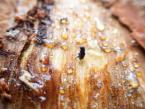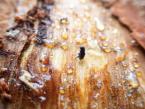Northeastern beach tiger beetles on Martha’s Vineyard have survived hurricanes and northeasters, parasitic moths and erosion. But there is yet another threat: tiger beetle collectors.
“There were people who collect insects, and I think some still do, and in this case they collected tiger beetles,” said Susi von Oettingen, an endangered species biologist with the U.S. Fish and Wildlife Service. “As if you collected baseball cards, and you get a series of them, and you trade them, basically. So you’re not just getting one tiger beetle for your collection, you’re getting five, 10, 15 or more.”
Tiger beetles are a federally-protected species and yet in the mid-1990s one such collector, a dentist from Kansas, talked his way onto the private beach on the Vineyard where the northeastern beach tiger beetle lives, telling the caretaker that he and his wife were in charge of the beetles and were going to check on the population, Ms. von Oettingen said.
“They did a very convincing job of telling the caretaker that they were in charge,” recalled Tim Simmons, a restoration ecologist with the Natural Heritage & Endangered Species Program.
The caretaker observed him collecting tiger beetles and reported him. The U.S. Fish and Wildlife Service enforcement agents looked into it.
“We have some of the greatest law enforcement special agents anywhere,” Ms. von Oettingen said. “They deal with elephants and rhinos, and they were very interested in these little tiger beetles.” Mr. Simmons said the poacher was identified through a description of his wife, and Mr. Simmons helped gather evidence against him, including exchanging an answering machine tape with enforcement officers.
They were able to gather the evidence to get a case against the collector for illegally collecting the threatened species, Ms. von Oettingen said, and a settlement agreement was reached.
Mr. Simmons recalled the fine was $3,000. Most important, the biologists said, the collector was ordered to give up all his data on rare tiger beetles to the states where he collected them. He was also placed on a watch list, Ms. von Oettingen said.
“We didn’t place him in jail or anything like that, because the data was far more valuable that putting him in jail.”
A short time later, though, he was caught by the Australian government illegally collecting beetles in Australia, they said. Mr. Simmons said he was transporting the beetles in yogurt containers.
“I don’t know what his status is now,” Ms. von Oettingen said. “I would hope that people know about his reputation . . . I hope he does not come back to New England.”







Comments
Comment policy »